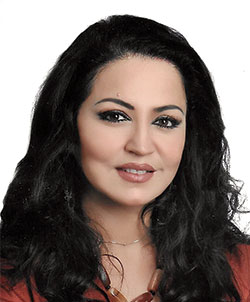Syrian Artist Wahe Al-Rahib Returns to Damascus After 13 Years in Exile

Syrian artist and director Wahe Al-Rahib has returned to her homeland after more than 13 years of forced absence, in a symbolic turning point in her artistic and activist journey. Al-Rahib left Syria in 2011 due to her support for the popular movement, openly declaring her support for freedom and dignity.
The Syrian Artists Syndicate celebrated her return, posting on its official Facebook page: "Thank God for your safety, esteemed artist colleague Wahe Al-Rahib in Damascus".
Al-Rahib also shared a photo of herself at the Syrian-Lebanese border, captioning it on her account: "My return to beloved Syria, the dream that was almost impossible. How sweet it is to return to it".
A Rich Artistic Journey of Boldness and Activism
Wahe Al-Rahib was born in Damascus and rose to prominence in the 1980s as an actress in notable dramatic and cinematic works such as "Desert Anger" and "The Volcano", before transitioning to directing and writing. She is among the first Syrian female artists to combine artistic creativity with a clear political stance.
One of her notable works is the film "Dreamy Visions" (2003), which she wrote and directed, winning Arab and international awards, addressing women's struggles in a male-dominated society. She also acted in the film "Identity", in addition to her contributions to critical writing through cultural and political articles published in several Arab platforms.
Government Pursuits and Forced Exile
Al-Rahib faced security harassment since the early 2000s due to her involvement in "Damascus Spring", where she signed statements advocating for political freedoms. In 2006, an unofficial ban on her artistic work was imposed, before she was compelled to leave after 2011 due to her support for the Syrian revolution.
In exile, she continued to express her views through writing in opposition media, while her works were banned from being shown in Syria.
Return to the "New Syria"
Al-Rahib returned with her husband, director Mamoun Al-Bani, as the country witnessed a political shift with the fall of the Assad regime last December. She received widespread congratulations from artists and cultural elites, in a scene that rekindles respect for artists who have suffered repression and exile.
Today, Wahe Al-Rahib opens a new chapter in her journey, in a country reclaiming its freedom and the creativity of its people.